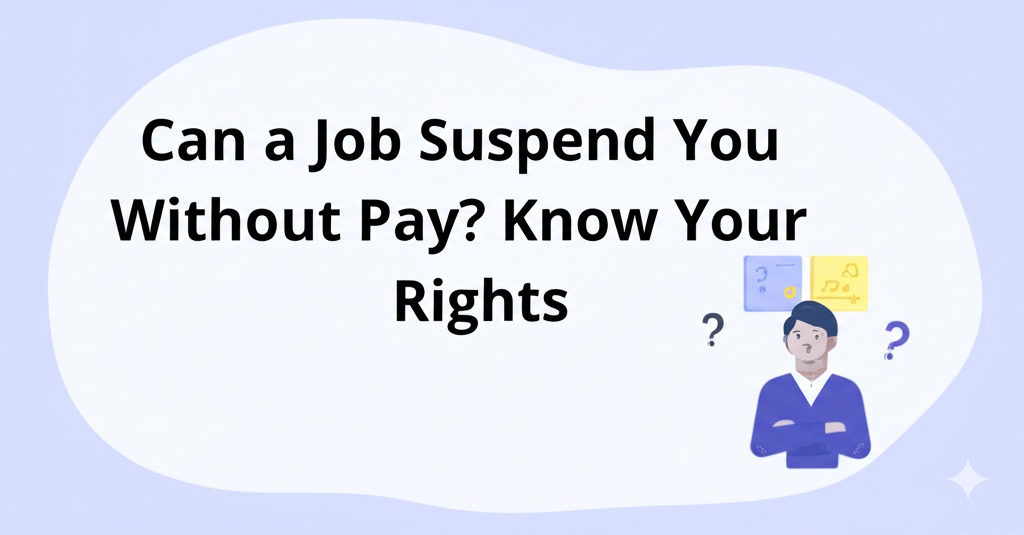
Imagine showing up for work only to be told you’re suspended—without pay. It’s a scenario that sparks confusion, fear, and a lot of questions. Can your employer really do that? Is it legal to suspend someone without pay? And what can you do if it happens to you?
In this article, we’ll break down everything you need to know about unpaid suspensions: when they’re legal, your rights as an employee, and what steps you can take to protect yourself.
What Does “Suspension Without Pay” Mean?
A suspension without pay means that an employee is temporarily removed from their duties and will not receive wages during the suspension period. This can happen for a variety of reasons and may last anywhere from a day to several weeks.
Common reasons for unpaid suspension include:
- Policy violations
- Pending investigations
- Disciplinary action
- Workplace misconduct
- Budget or staffing issues (rare cases)
While it might feel unfair, suspension without pay can be legal under certain conditions. Let’s dig into the legal side of things.
Is It Legal for an Employer to Suspend You Without Pay?
Yes, in many cases, an employer can legally suspend an employee without pay, but the specifics depend on several factors—including your employment classification, state laws, and company policies.
1. At-Will Employment
In the U.S., most workers are employed “at will,” meaning either the employer or employee can end the job relationship at any time, with or without cause. Under this arrangement:
- Employers can suspend employees without pay, especially for disciplinary reasons.
- They are not always required to provide notice beforehand.
2. Exempt vs. Non-Exempt Employees
The Fair Labor Standards Act (FLSA) classifies workers as either exempt (salaried) or non-exempt (hourly). The rules differ for each:
Non-Exempt Employees:
- Can be suspended without pay at any time.
- Employers are only required to pay them for hours actually worked.
Exempt Employees:
- Suspension without pay is trickier.
- Employers can only dock pay for serious workplace violations (e.g., harassment, safety breaches), and the unpaid time off usually must be in full-day increments.
If a salaried employee is suspended for a partial day, the employer may be violating wage laws unless the absence falls under a specific legal exception.
When Suspension Without Pay Might Be Illegal
While employers do have the right to suspend workers, there are cases where unpaid suspension crosses the line into unlawful territory.
Examples of potentially illegal suspensions:
- Discrimination: If the suspension is based on race, gender, age, religion, or other protected characteristics.
- Retaliation: If you’re suspended after reporting harassment, discrimination, or unsafe working conditions.
- Breach of contract: If your employment agreement prohibits unpaid suspensions or sets specific disciplinary procedures.
- Violation of labor laws: Docking pay from salaried employees for improper reasons may break wage-and-hour laws.
If you suspect your unpaid suspension isn’t lawful, it’s important to document everything and seek legal advice.
What to Do If You’re Suspended Without Pay
Getting suspended can be stressful, but how you respond can make a big difference. Here are some practical steps to take:
1. Ask for a Written Explanation
- Request a written notice explaining the reason for your suspension and the expected duration.
- This helps clarify your employer’s stance and protects you in case of future disputes.
2. Review Your Employment Contract or Handbook
- Look for any language about disciplinary actions or suspension policies.
- Some companies must follow specific procedures before suspending employees.
3. Know Your Rights
- Research your state labor laws, as rules can vary widely.
- Consider contacting your state labor board for guidance.
4. Consult a Legal Professional
- If your suspension feels unfair or illegal, a labor attorney can help assess your case.
- They may assist in filing a grievance, complaint, or even a lawsuit, if necessary.
How Long Can a Job Suspend You Without Pay?
There’s no universal limit, but the length of a suspension often depends on:
- The nature of the alleged misconduct
- Whether an investigation is involved
- Company policy or union agreements
Prolonged suspensions without clear communication may be a red flag. If weeks go by with no update, it’s worth pushing for answers or seeking legal help.
How to Protect Yourself from Unfair Suspensions
While you can’t always prevent a suspension, you can take steps to safeguard your rights and reputation at work:
- Stay informed: Understand your employment classification and rights.
- Follow company policies: Avoid actions that could trigger disciplinary measures.
- Document everything: Keep records of conversations, emails, and notices related to your suspension.
- Stay professional: Even if you feel wronged, maintain a calm and respectful demeanor.
Final Thoughts: Can a Job Suspend You Without Pay?
Yes, a job can suspend you without pay, but that doesn’t mean it’s always right—or legal. The legality depends on your job classification, the reason for the suspension, and the applicable laws in your area.
If you find yourself in this situation, don’t panic. Ask for clarity, know your rights, and take steps to protect your employment and income. If things seem off, consult an employment attorney—you don’t have to go through it alone.

Andre Cuevas provides career insights, job search strategies, and professional advice to help individuals navigate the job market and achieve their career goals.






